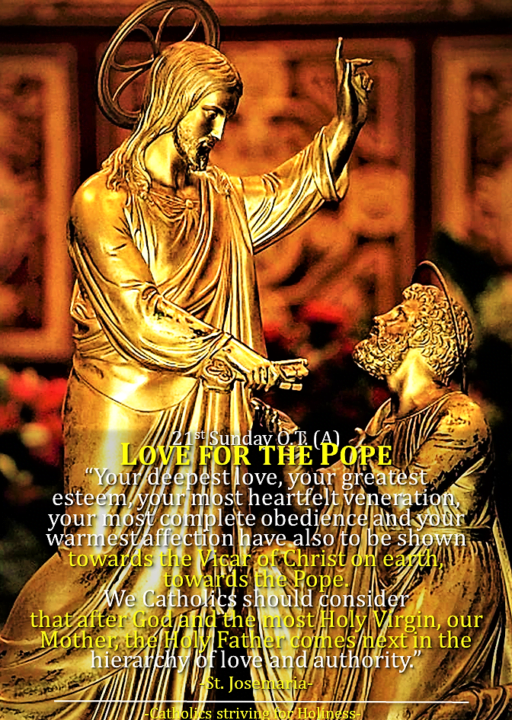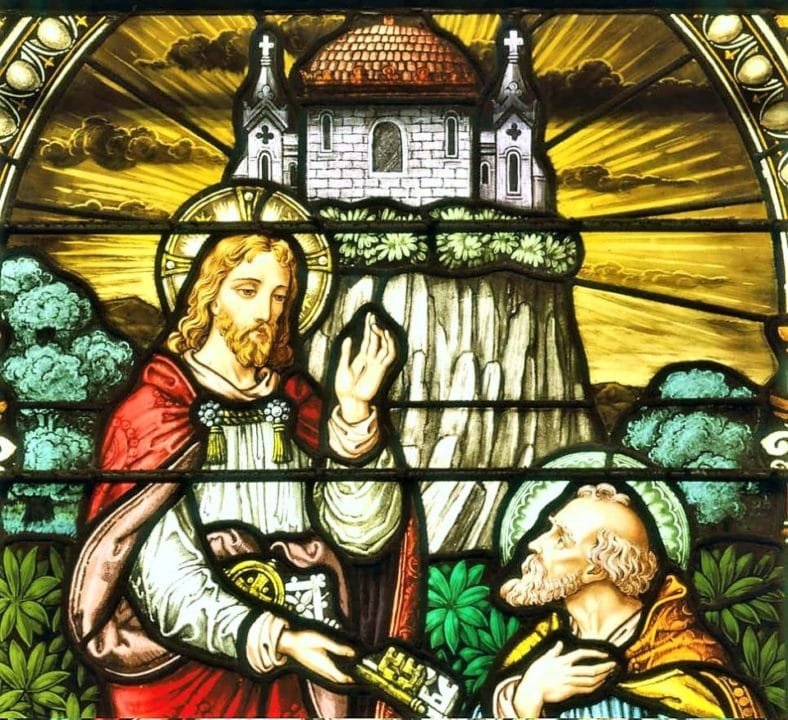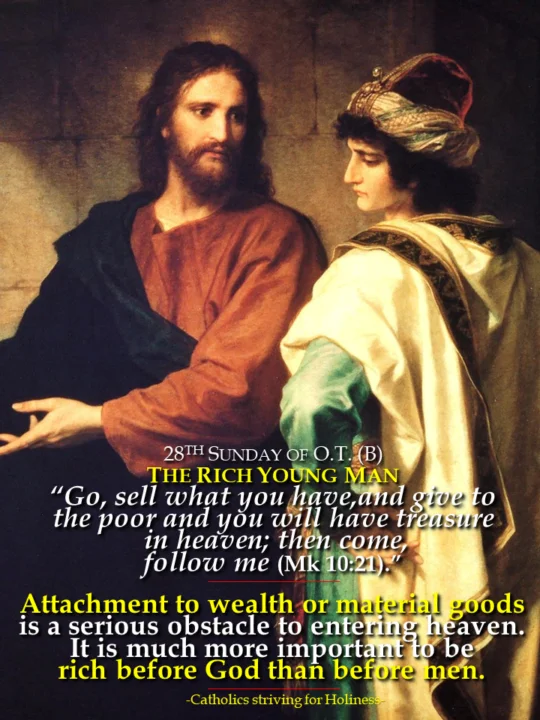21ST Sunday in Ordinary Time Year A Reflection homily. DO YOU LOVE THE POPE, CHRIST’S VICAR ON EARTH?

1. Summary of Ideas of today’s Sunday readings:
Christ grants the keys of the Kingdom of Heaven to Peter after his profession of faith. The first reading alludes to this power of the keys in the Old Testament. Saint Paul crowns his reflections on the destiny of Israel with a hymn to the infinite wisdom of God.
- Is 22, 19-23: “I will place the key of the House of David on Eliakim’s shoulder; when he opens, no one shall shut when he shuts, no one shall open.” In the Old Testament, the sign of power and responsibility for the fate of the people was the imposition of the keys on the shoulders of the elect.
The function of the keys is the power to open and close the palace of the king, the absolute sovereign. This corresponds to the prime minister or vizier. It is like the plenipotentiary of the king, the one who takes his place, that is, his vicar. - This will be in the New Testament the function of Peter in the Church, the kingdom of God. The Church prays n the antiphons “Oh”, before Christmas: “O key of David and scepter of the House of Israel.” It is the power that Christ entrusted first to Peter and his successors, then to the other apostles. It grants the power to bishops and priests to forgive sins in the sacrament of penance. It is the great mercy of the Lord towards sinful man.
- For this we sing in Psalm 137: Lord, your love is eternal; do not forsake the work of your hands. We thank the Lord for it with all our hearts, we praise him, we venerate him, we thank him. He listens to us when we invoke him … he looks at the humble and knows the proud from afar “. Christ who, being rich, became poor, encourages his Church in the midst of trials, so that she may never lose heart, but always keep her eyes fixed on his great mercy.
- Rm 11, 33-36: Christ is the origin, guide and goal of the universe. Saint Paul, at the end of his reflection on the mystery of Israel and on the role of the law of salvation, as illuminated by the light of Christ, broke out in with a cry that exalts the divine wisdom of the saving plan of humanity. “Oh, the depth of the riches and wisdom and knowledge of God!”
2. Peter’s profession of faith in Jesus’ divinity and his primacy over the other Apostles in the Church founded by Christ.

Today’s Gospel speaks to us about the PETER’S PROFESSION OF FAITH IN JESUS’ DIVINITY and the PRIMACY OF PETER:
Now when Jesus came into the district of Caesarea Philippi, he asked his disciples, “Who do men say that the Son of man is?” And they said, “Some say John the Baptist, others say Elijah, and others Jeremiah or one of the prophets.” He said to them, “But who do you say that I am?” SIMON PETER REPLIED, “YOU ARE THE CHRIST, THE SON OF THE LIVING GOD.” And Jesus answered him, “Blessed are you, Simon Bar-Jona! For flesh and blood has not revealed this to you, but my Father who is in heaven. AND I TELL YOU, YOU ARE PETER, AND ON THIS ROCK I WILL BUILD MY CHURCH, AND THE POWERS OF DEATH U SHALL NOT PREVAIL AGAINST IT. I WILL GIVE YOU THE KEYS OF THE KINGDOM OF HEAVEN, AND WHATEVER YOU BIND ON EARTH SHALL BE BOUND IN HEAVEN, AND WHATEVER YOU LOOSE ON EARTH SHALL BE LOOSED IN HEAVEN.” (Mt 16: 13-21)
These Gospel passages are of utmost importance because in them Our Lord Jesus Christ promised the primacy of Peter over the Church which Our Lord founded on Peter (rock=Cephas), and at the same time the powers he will have to exercise his supreme authority over His Church, symbolized by the giving of the keys, which during the ancient times, signifies giving authority over one’s city or property (see as well 1st reading, Is 22:19–23 where Our Lord tells Sheba that he “will place the key of the House of David on Eliakim’s shoulder” ).
It is a primacy which is to be CONFERRED and at the same time CONFIRMED onto him in the loving dialogue recounted by St. John when Our Lord asked Peter thrice if he loves Him. (Cf. Jn 21: 15-19)
- That Jesus asked Peter if he loves Him thrice is noteworthy. It is as if Jesus wanted to give Peter a triple opportunity to atone for his triple denial. But each time Our Lord asked Peter the same question: “Do you love me?” and Peter responds affirmatively, Jesus responded with a corresponding task entrusting Peter to feed, tend and feed his lambs and sheep. What did Our Lord mean by this?
- Not only does it signify that ALL LOVE HAS ITS RESPONSIBILITIES (fidelity, unity, sacrifice, self-giving, forgetting oneself, fecundity, understanding, mercy and forgiveness…);
- But also, it is the essential moment of fulfilling his promise in Mt 16, giving the primacy to Peter over His Church in a direct and immediate manner, a primacy which is passed onto his successors, the Popes till the present day.
It is worthwhile to review the points of the Catechism of the Catholic Church on the primacy of Peter, which are the following:
881 The Lord made Simon alone, whom he named Peter, the “rock” of his Church. He gave him the keys of his Church and instituted him shepherd of the whole flock. “The office of binding and loosing which was given to Peter was also assigned to the college of apostles united to its head.” This pastoral office of Peter and the other apostles belongs to the Church’s very foundation and is continued by the bishops under the primacy of the Pope.
882 The Pope, Bishop of Rome and Peter’s successor, “is the perpetual and visible source and foundation of the unity both of the bishops and of the whole company of the faithful.” “For the Roman Pontiff, by reason of his office as Vicar of Christ, and as pastor of the entire Church has full, supreme, and universal power over the whole Church, a power which he can always exercise unhindered.”
3. Love for the Pope is a clear manifestation of our love for Christ and His Church for the Pope is the Vicar of Christ on earth.
Dear friends: Let us then THANK OUR LORD JESUS CHRIST FOR LEAVING ALL THINGS IN PLACE BEFORE ASCENDING INTO HEAVEN, CONFERRING THE GRACE OF PRIMACY OF HONOR, JURISDICTION AND AUTHORITY TO PETER AND HIS SUCCESSORS TO GUARD AND PROTECT THE UNITY OF THE CHURCH FOUNDED BY OUR LORD JESUS CHRIST IN FAITH, LOVE AND COMMUNION. It is something which Our Lord Jesus Christ wanted and it is not based on human customs or caprice.
As such, Peter, and each his successors, is the SHEPHERD of the entire universal Church and the VICAR OF CHRIST, i.e., the when the Pope acts or exercises his authority, he is exercising Christ’s own authority.
At this point, let us examine ourselves: Do we have a theological and human love for the Pope, the Vicar of Christ on earth?
St. Josemaria encourages us: “Offer your prayer, your atonement, and your action for this end: ut sint unum! – that all of us Christians may share one will, one heart, one spirit. This is so that omnes cum Petro ad Iesum per Mariam – that we may all go to Jesus, closely united to the Pope, through Mary.” The Forge, 647
Let us also ask Our Lord to engrave in our heart a DEEP LOVE AND DEVOTION FOR “SWEET CHRIST ON EARTH”, as St. Catherine of Sienna used to call the Roman Pontiff and THAT THIS LOVE BE TRANSLATED INTO PRAYER AND MORTIFICATION, COUPLED WITH OBEDIENCE!
“Welcome the Pope’s words with a religious, humble, internal and effective acceptance. And pass them on.” The Forge, 133
Click on this link for the 21st Sunday in Ordinary Time Year A Mass prayers and readings.
VIDEO COMMENTARY ON TODAY’S GOSPEL
TOPIC: What are some of the Protestant questions about the Pope?
The Pope’s role as the leader of the whole Catholic Church, along with being head of his small country, and Bishop of Rome, has united the whole Catholic community for the last 2000 years.
But questions persist about the Papacy. Let’s answer some of them:
1. Where in the Bible does the word “Pope” shown?
2. Where does the Pope get his authority to be head of the Catholic Church?
3. Assuming the Pope has the authority, why would Peter be the first Pope?
Let us dwell on them all. I draw from the writings and vlogs of Paul Whitcomb and Bro. Casey Cole, OFM, and Fr. Mike Schmidts.
- For context, we go back to the time of Jacob, who was the son of Isaac, who was the son of Abraham. Jacob was renamed Israel and he had 12 sons which made up the 12 tribes of Israel. David brings all the 12 tribes into one kingdom. Samuel, the prophet anoints David, the “Messiah,” the youngest, from among the 8 sons of Jesse to succeed King Saul. He was succeeded by his son, Solomon, and the kingdom breaks up. Only two tribes in the south remained as Assyria conquers the 10 tribes in the north. Many years later, Jesus was born. And John’s words before baptizing Jesus was to repent for the kingdom of heaven is at hand. (Matthew 3:2) Jesus will be reconstituting the 12 tribes and started his public ministry by appointing Andrew and Simon from the north in the two tribes that were obliterated, to be part of his apostles. And he completes the 12. And when He went away, He appoints Peter to take care of His Church, which is in today’s gospel.
- The papacy, in other words, has its roots way back in the Old Testament. But Jesus formalizes the role of head of his Church in Peter before Jesus goes away.
Okay. So now, let’s answer the questions.
1. Where does the word Pope appear in the Bible?
- The word “Pope” does not appear in the Bible. But neither does the words “Ascension,” “Bible,” “Incarnation,” “Trinity.” They are referred to by other names.
2. Where does the Pope get his authority to be head of the Catholic Church?
- The Pope, which means “Head Bishop,” is referred to as the “Rock” of the Church or as “Shepherd” of the Church. Christ used that term when He appointed Peter as the first head bishop of His Church, saying, “Blessed are you, Simon son of Jonah. For flesh and blood has not revealed this to you, but my heavenly Father. And so I say to you, you are Peter, and upon this rock I will build my Church. . . I will give you the keys to the kingdom of heaven. Whatever you bind on earth shall be bound in heaven; and whatever you loose on earth shall be loosed in heaven.” (Matthew 10:17-19).
- No one among the other apostles received a similar remark from Jesus, proving Peter’s primacy.
- “So there will be one flock, one shepherd.” (John 10:16)
- “Feed my lambs. . .Tend my sheep. . .Feed my sheep.” (John 21:15-17)
The words “rock” and “shepherd” must apply to Peter as head apostle over the rest, or else, Jesus’ words will become so vague and, thus, meaningless.
The apostles did recognize him as the head apostle, given authority by Christ, everytime they met as a council. “In those days Peter stood up among the believers (together the crowd numbered about one hundred twenty persons)” (Acts 1:15).
Peter’s name was also the first name every time the gospel writers listed the names of the Apostles as you can see from this slide – in Matthew, Mark, Luke and the Acts.
3. Assuming the Pope has the authority, why would Peter be the first Pope?
- The testimony of the Church Fathers point to Peter’s primary role in the Church
All these prove that Peter is first in the long line of Popes, with Pope Francis as the 266th Pope. There were exceptional popes and sinful popes but that is a story for another day.
A Blessed week ahead and God bless! Fr. Rolly Arjonillo.
